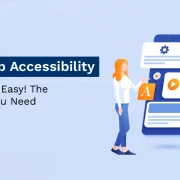
10 Ways a Moodle LMS Can Transform Corporate Training
Corporate training is an essential part of every enterprise. Businesses need to train new employees regarding in-house practices and their roles and responsibilities. You also have to train employees to use new software or a new business process you’re planning to bring in.
The need for training in an organization is endless, and so is the search for the best training platform. During this quest you will definitely come across the term Moodle. In this blog, we will talk about what is Moodle and how can a Moodle Learning Management System or a Moodle LMS transform corporate training?
Table of Contents:
Benefits of Using Moodle for Corporate Training
Before learning why you should opt for a Moodle-based LMS, it is pertinent to understand what Moodle is. Moodle stands for Modular Object-Oriented Dynamic Learning Environment. It is an open-source platform that was developed in 2002 by Martin Dougiamas to facilitate the creation of personalized learning environments. Moodle is used by educational institutions as well as corporate enterprises, to enable easy and seamless access to online learning modules.
Also Read: Should You Implement an LMS Yourself or Hire a Provider?
Here are some of the benefits of using Moodle for corporate training.
1. Open Source
The biggest advantage of using Moodle for corporate training is that it is an open-source LMS platform. Being an open-source platform, it is free to use, and you have access to the source code. Moodle is distributed under the General Public License. You are free to change the source code as much as you want to make sure that you have an LMS that reflects your company’s style.
2. User-Friendly
It would be a shame if the training platform you want to deploy needed prior training to use. Moodle for corporate training is an extremely user-friendly platform with an intuitive design. Anyone who starts using it will have no trouble understanding how to navigate the courses and access the various features.
The user-friendliness of an LMS platform is important because employees from various departments will be using it. You cannot expect everyone to be tech-savvy. The platform is also to be used by those who aren’t experts at using the software. Therefore, Moodle’s user-friendliness is a serious advantage.
3. Customizable
You can add your company’s name and logo on every page, customize the font, add graphics when needed, and design your own course plan and evaluation technique. The possibilities are endless, with an open-source LMS platform.
It also means that every Moodle training system will look different. You won’t be able to look at two LMS and instantly guess that they are both developed on Moodle. Your users will have a unique experience that will be reflective of your company’s style.
4. Supports Multiple Devices
All your employees may not be accessing the LMS from the same type of device. Some may use their personal computers, some may use their laptops, whereas some others might use their mobile phones.
Therefore, your LMS must be compatible with all the devices. Moodle is compatible with computers and mobile phones equally. It doesn’t diminish the user experience when they switch from one device to another.
5. Track User Progress
Tracking the progress of each user is crucial for an effective LMS. Moodle LMS provides an excellent tracking and reporting system. Not only does it tell each user about their progress and their learning journey so far, but it also informs the management about the overall progress of the employees.
Based on this information, you can gauge the impact of the training on the employee’s work. Accurate progress tracking is key to the success of any employee training.
6. Cost-Effective
As mentioned above, Moodle for corporate training is an open-source LMS platform, which means it is free. All you need to do is customize and modify the platform to suit your needs. If you have in-house Moodle developers, then you won’t even have to spend extra on the customization. But if you do not have resources with the necessary skill sets, you can still hire Moodle developers to customize it for you.
The cost of customizing Moodle is much lesser than the cost of purchasing a readymade platform or developing an LMS platform from scratch.
7. Offline Access
Not every employee may have internet access at all times. Some may take the training during their daily commute to and from office, and the network connection may not be very reliable during the commute.
Moodle allows users to download course content for offline access. It enables your employees to get their training even when the network is unreliable.
8. Ease of Integration
An LMS platform is not the only business process platform that you may be using in your company. Your human resource management, workflow management, compliance system, and various other such processes may be using different software tools.
You will need to integrate the training details with a few of these systems. It is extremely easy to integrate Moodle with other systems within the organization.
9. Global Community Support
Another benefit of using an open-source LMS platform is that it has a large user base and the support of the global community of developers. Most of them use Moodle and, therefore, know what the users want.
The global community is always striving to improve Moodle and introduce various plug-ins that can help in adding features and customizing the platform.
10. Secure
Your training material may contain sensitive company information, making it crucial that the LMS offers content security. By using Moodle for corporate training, you can ensure that all users can log in to the platform securely. You can also control which users can access what data. The secure login and user access control features make it a very secure LMS platform.
Also Read: Does Your LMS Have These 7 Features?
Step Up Your Corporate Training with Moodle LMS!
A well-designed training program not only helps the employees upskill themselves and learn about the tools and processes required to do their jobs, but it also helps the enterprise in many ways. An excellent LMS automates the training and creates the perfect environment to improve the business. Leveraging Moodle for corporate training will enable you to get the maximum out of your training process.
Hurix Digital helps business achieve their full potential. Get in touch with our experts to know more!

Vice President & SBU Head –
Delivery at Hurix Technology, based in Mumbai. With extensive experience leading delivery and technology teams, he excels at scaling operations, optimizing workflows, and ensuring top-tier service quality. Ravi drives cross-functional collaboration to deliver robust digital learning solutions and client satisfaction






